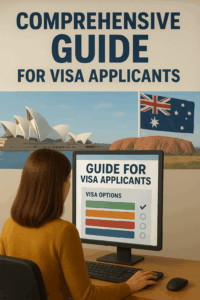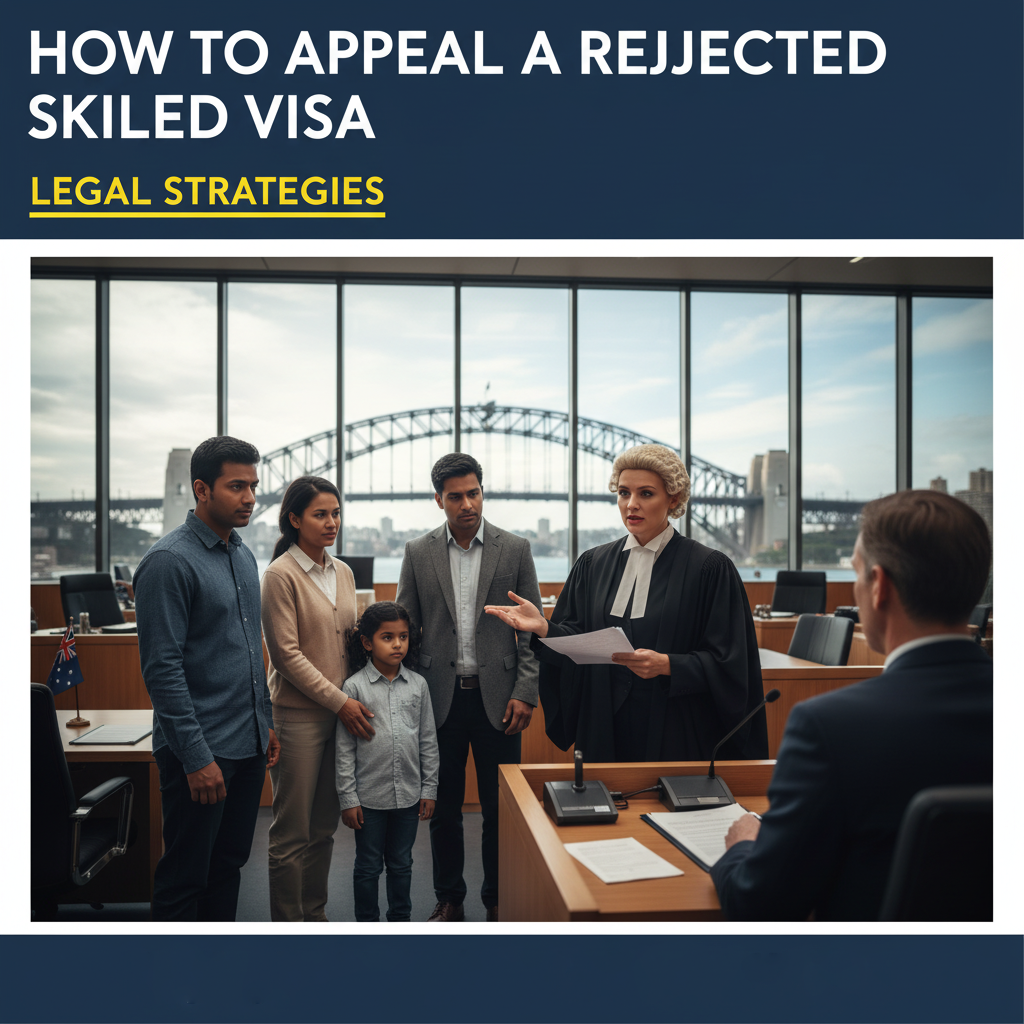Learn effective legal strategies to appeal a rejected skilled visa in Australia. Understand the appeal process, deadlines, and tips to improve your chances.
Introduction
Each year, thousands of skilled visa applications are refused by the Australian Department of Home Affairs. While a visa refusal can be disappointing, it doesn’t have to end your migration journey. Knowing how to appeal a rejected skilled visa can provide you with a vital second chance. This article explains the appeal process, legal strategies, and practical tips to help you successfully challenge a visa refusal.
Understanding Skilled Visa Refusals and Appeal Rights
When your skilled visa application is rejected, the Department issues a refusal letter outlining the reasons. Common grounds for refusal include failure to meet eligibility criteria, insufficient evidence, or errors in documentation. Importantly, the refusal letter also specifies whether you have the right to appeal and the deadline to lodge your appeal, usually 21 days for applicants within Australia.
Grounds for Refusal
- Not meeting the points test or eligibility requirements
- Incomplete or inconsistent documentation
- Unsatisfactory English language proficiency
- Health or character concerns
- Errors or omissions in the application
Understanding your refusal reasons is critical because your appeal must directly address these issues.
Appeal Rights and Deadlines
Most skilled visa refusals lodged onshore can be appealed to the Administrative Appeals Tribunal (AAT). Offshore applicants may have different appeal rights depending on visa subclass and circumstances. The refusal letter details:
- Your appeal rights
- The tribunal or court for the appeal
- The deadline to lodge the appeal (usually 21 days)
Missing the deadline typically forfeits your right to appeal.
Legal Strategies to Appeal a Rejected Skilled Visa
Appealing a rejected skilled visa requires a strategic and well-prepared approach. Below are key legal strategies to enhance your appeal.
-
Lodge Your Appeal Promptly
Timeliness is crucial. You must submit your appeal to the AAT within the specified deadline, typically 21 days from the refusal decision. Late appeals are rarely accepted unless exceptional circumstances exist.
-
Understand the Appeal Process
The appeal process involves:
- Filing a Notice of Appeal: Submit your appeal application online or by post.
- Paying the Appeal Fee: Fees apply but may be waived in hardship cases.
- Case Management: The tribunal may request additional documents or evidence.
- Hearing: You or your representative present your case before tribunal members.
- Decision: The tribunal makes a fresh decision, which can affirm, vary, or overturn the refusal.
Knowing this process helps you prepare effectively.
-
Gather New and Compelling Evidence
An appeal is not a re-submission of your original application. You must provide new or additional evidence that directly addresses the refusal reasons. This may include:
- Updated qualifications or employment references
- Expert reports or legal opinions
- Clarifications or corrections to errors
- Evidence of changed circumstances, such as improved English test scores
Strong evidence that counters the refusal grounds is essential.
-
Prepare Thoroughly for the Hearing
The hearing is your opportunity to explain why the refusal was incorrect. Preparation tips include:
- Organizing your documents logically
- Practicing clear, concise explanations
- Being honest and respectful
- Considering legal representation for advocacy and advice
Tribunal members expect well-prepared cases.
-
Engage an Immigration Visa Appeal Lawyer
While legal representation is not mandatory, hiring a migration lawyer or registered migration agent experienced in visa appeals can significantly improve your chances. Professionals understand tribunal procedures, legal grounds for appeal, and how to frame your case effectively.
They can:
- Identify legal errors in the refusal
- Advise on the best evidence to submit
- Prepare you for the hearing
- Negotiate or mediate with the Department if necessary
-
Explore Alternative Remedies if the Appeal Fails
If the AAT upholds the refusal, you can consider:
- Judicial Review: Applying to the Federal Circuit Court to review the tribunal’s decision on legal grounds.
- Ministerial Intervention: Requesting the Minister for Immigration to exercise discretion on compassionate or compelling grounds.
- Reapplication: Submitting a new visa application with stronger evidence.
Each option has specific requirements and risks, so seek expert advice.
Practical Steps to Strengthen Your Skilled Visa Appeal
Step 1: Review the Refusal Letter Carefully
Understand the exact reasons for refusal. This helps tailor your appeal and evidence.
Step 2: Collect and Organize Evidence
Gather documents that directly address refusal points, such as updated qualifications, employment letters, or English test results.
Step 3: Lodge Your Appeal on Time
Submit your appeal within the deadline with all required forms and fees.
Step 4: Prepare for the Tribunal Hearing
Practice your presentation and organize your documents for easy reference.
Step 5: Seek Professional Help
Consider hiring a migration lawyer or agent to guide you through the process.
Common Challenges in Skilled Visa Appeals and How to Overcome Them
- Complex Legal Grounds: Some refusals involve complex legal issues. Expert advice is crucial.
- Time Pressure: Strict deadlines require quick action.
- Gathering New Evidence: Sometimes it’s hard to find new evidence; consider expert reports or updated documents.
- Emotional Stress: Appeals can be stressful; support from professionals and family helps.
Conclusion
Appealing a rejected skilled visa is complex but achievable with the right legal strategies and preparation. Understanding your appeal rights, acting swiftly, gathering strong evidence, and seeking professional advice can significantly improve your chances of overturning a visa refusal. Don’t let rejection end your migration journey—start your appeal process today.



